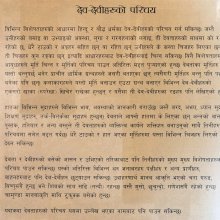Ityadi, Ityādi, Iti-adi: 12 definitions
Introduction:
Ityadi means something in Hinduism, Sanskrit, Marathi, Hindi. If you want to know the exact meaning, history, etymology or English translation of this term then check out the descriptions on this page. Add your comment or reference to a book if you want to contribute to this summary article.
Images (photo gallery)
Languages of India and abroad
Marathi-English dictionary
Source: DDSA: The Molesworth Marathi and English Dictionaryityādi (इत्यादि).—a (S iti & ādi Thus first or principally; this being chief; thus or this as the first.) This formation well corresponds with Et cetera. In comp. with a word following it ordinarily assumes ka and becomes ityādika.
Source: DDSA: The Aryabhusan school dictionary, Marathi-Englishityādi (इत्यादि).—a Et cetera.
Marathi is an Indo-European language having over 70 million native speakers people in (predominantly) Maharashtra India. Marathi, like many other Indo-Aryan languages, evolved from early forms of Prakrit, which itself is a subset of Sanskrit, one of the most ancient languages of the world.
Sanskrit dictionary
Source: DDSA: The practical Sanskrit-English dictionaryItyādi (इत्यादि).—a. having such a thing or things at the beginning, so forth, et cætera (&c.). इत्यादिप्रचुराः पुरातन- कथाः सर्वेभ्य एवं श्रुताः (ityādipracurāḥ purātana- kathāḥ sarvebhya evaṃ śrutāḥ) Udb.
Ityādi is a Sanskrit compound consisting of the terms iti and ādi (आदि).
Source: Cologne Digital Sanskrit Dictionaries: Shabda-Sagara Sanskrit-English DictionaryItyādi (इत्यादि).—ind. Etcetera, and so forth.
Source: Cologne Digital Sanskrit Dictionaries: Cappeller Sanskrit-English DictionaryItyādi (इत्यादि).—adj. beginning thus; [neuter] — and so on.
Source: Cologne Digital Sanskrit Dictionaries: Monier-Williams Sanskrit-English DictionaryItyādi (इत्यादि):—[=ity-ādi] [from iti] mfn. having such (thing or things) at the beginning, thus beginning, and so forth, et caetera, [Hitopadeśa; Vetāla-pañcaviṃśatikā; Vedāntasāra, etc.]
Source: Cologne Digital Sanskrit Dictionaries: Yates Sanskrit-English DictionaryItyādi (इत्यादि):—[ityā+di] ind. Et cetera.
Source: DDSA: Paia-sadda-mahannavo; a comprehensive Prakrit Hindi dictionary (S)Ityādi (इत्यादि) in the Sanskrit language is related to the Prakrit word: Iccāi.
[Sanskrit to German]
Sanskrit, also spelled संस्कृतम् (saṃskṛtam), is an ancient language of India commonly seen as the grandmother of the Indo-European language family (even English!). Closely allied with Prakrit and Pali, Sanskrit is more exhaustive in both grammar and terms and has the most extensive collection of literature in the world, greatly surpassing its sister-languages Greek and Latin.
Hindi dictionary
Source: DDSA: A practical Hindi-English dictionaryItyādi (इत्यादि):—[[~ka]] (ind) etcetera, so on and so forth.
...
Kannada-English dictionary
Source: Alar: Kannada-English corpusItyādi (ಇತ್ಯಾದಿ):—[noun] and others; and the like; and the rest; and so forth; et cetera.
Kannada is a Dravidian language (as opposed to the Indo-European language family) mainly spoken in the southwestern region of India.
See also (Relevant definitions)
Starts with: Ityadik, Ityadika.
Full-text (+11): Ityevamadi, Iccai, Ityati, Drishtica Khela, Tulaguda, Trimuparna, Samgraha, Akarshana, Svabhavashuddha, Samgrahaka, Vajrakarshana, Ananyaja, Ananyajanman, Hayagayi, Hayagaya, Dhyanimmanim, Pragandi, Hayagai, Prasiddha, Samanya.
Relevant text
Search found 34 books and stories containing Ityadi, Iti-adi, Iti-ādi, Ity-adi, Ity-ādi, Ityādi; (plurals include: Ityadis, adis, ādis, Ityādis). You can also click to the full overview containing English textual excerpts. Below are direct links for the most relevant articles:
Tattvartha Sutra (with commentary) (by Vijay K. Jain)
Verse 2.23 - The possessors of the remaining four senses < [Chapter 2 - Category of the Living]
Verse 3.7 - The transverse world (tiryagloka) < [Chapter 3 - The Lower World and the Middle World]
Verse 4.14 - The divisions of time (kāla-vibhāga) < [Chapter 4 - The Celestial Beings]
Sahitya-kaumudi by Baladeva Vidyabhushana (by Gaurapada Dāsa)
Text 9.11 < [Chapter 9 - Ornaments of Sound]
Text 7.53 < [Chapter 7 - Literary Faults]
Text 7.140 < [Chapter 7 - Literary Faults]
Bhakti-rasamrta-sindhu (by Śrīla Rūpa Gosvāmī)
Verse 2.1.317 < [Part 1 - Ecstatic Excitants (vibhāva)]
Verse 3.4.23 < [Part 4 - Parenthood (vātsalya-rasa)]
Verse 3.1.10 < [Part 1 - Neutral Love of God (śānta-rasa)]
The Tattvasangraha [with commentary] (by Ganganatha Jha)
Verse 2762-2766 < [Chapter 24b - Arguments against the reliability of the Veda (the Revealed Word)]
Verse 1392-1393 < [Chapter 18 - Inference]
Verse 3601-3605 < [Chapter 26 - Examination of the ‘Person of Super-normal Vision’]
Prasthanatrayi Swaminarayan Bhashyam (Study) (by Sadhu Gyanananddas)
12.2. Virtues Helpful in Spiritual Progress < [Chapter 4 - Analysis on the Basis of Spiritual Endeavour]
2.5. The Relation Between Īśvaras and Parabrahman < [Chapter 3 - Analysis on the Basis of Metaphysics]
7.1. Arcirādi Mārga: The Way to the Abode of Parabrahman < [Chapter 5 - Analysis on the basis of Soteriology]
Brihad Bhagavatamrita (commentary) (by Śrī Śrīmad Bhaktivedānta Nārāyana Gosvāmī Mahārāja)
Verse 2.3.84 < [Chapter 3 - Bhajana (loving service)]
Verse 1.2.24-26 < [Chapter 2 - Divya (the celestial plane)]
Verse 1.4.51 < [Chapter 4 - Bhakta (the devotee)]
